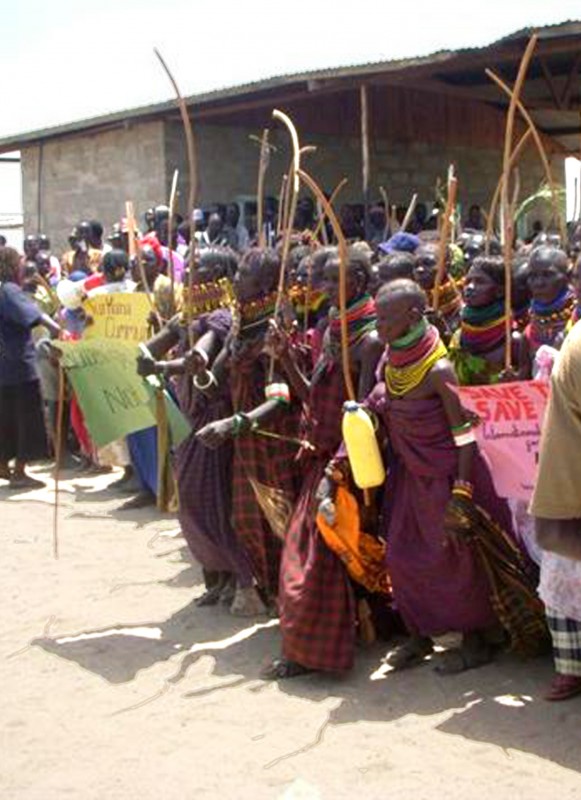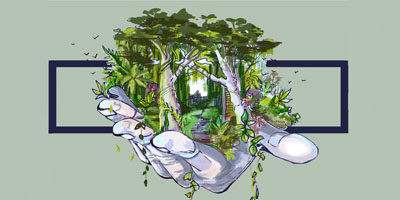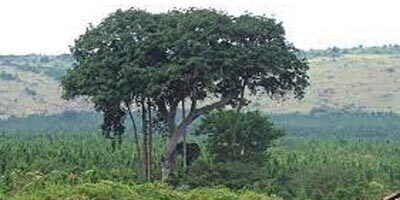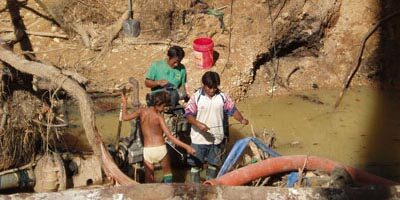
Local villagers protest construction of the dam.
Photo courtesyInternational Rivers
“The Gibe III is the worst dam I have ever come across,” one World Bank consultant told Ikal Angelei, the chairperson of the Kenyan organization Friends of Lake Turkana, referring to the large hydroelectric project in Ethiopia.
Friends of Lake Turkana filed a complaint last year with the African Development Bank (AfDB), one of the primary financial contributors to the Gibe III dam, concerned that the social and environmental impact assessment of the project is “seriously flawed.” The group urged the AfDB to improve mitigation efforts and consultations with local indigenous people.
“It’s the responsibility of the AfDB management to consult the communities who will be negatively affected by the dam,” Angelei said.
The complaint was heard. A few months ago the Bank hired two consultants to meet with the indigenous communities. “We don’t know what will be the consequence of that. Will the African Development Bank take that as a sign that they don’t have the communities’ consent? Or does it mean that they consulted and will carry on with the project anyway?”
The Gibe I and Gibe II dams have already been built along the Omo river, but the Gibe III will be the largest. Hydroelectricity is one of the country’s few exploitable resources and the Ethiopian government’s hopes are high. It wants to outsource electricity to other countries through interconnected grid systems.
The dam is being built on Ethiopia’s Omo river, which flows south to Kenya’s Lake Turkana. According to the US NGO International Rivers, the Gibe III dam will negatively affect sources of food for an estimated 500,000 indigenous people because of disruptions to the river’s flood cycle.
This includes people who rely on flood/retreat methods of agriculture production as well as the people at Lake Turkana. The annual flood also sustains the grazing land for shepherds and signals migratory fish to begin spawning.
Yvan Cliché, spokesperson for the African Development Bank (and a former spokesperson for Hydro-Québec) insists that the dam will not threaten the livelihood of the indigenous people.
“On the contrary, the dam on the Omo River will be beneficial to Lake Turkana. Controlled flood at the level of the dam will permit agriculture activities downstream, without the associated losses due to natural floods. It will also help keep the average water level in Lake Turkana higher than historical levels.” But he admits that mediation efforts and impact assessments “are still ongoing”.
Angelei is convinced that the people who live around the Omo River and Kenyans around Lake Turkana will all be adversely affected. If her worries are realized and the flood cycle does disrupt the livelihood of the indigenous people, tension and armed conflict between ethnic groups are likely to increase due to scarce resources. International Rivers notes that firearms and violent conflicts are already present throughout the Lower Omo region and a loss of resources can only worsen the situation.
Angelei is critical of what she takes to be the mindset Ethiopian government. “Many governments look at the value of everything on a GDP level. They don’t really care about the communities this will affect. It’s collateral damage.”
She is concerned that the AfDB’s Environmental and Social Impact Assessment is still not finalized, yet the construction of the dam began in 2006. “We want the government, the banks and everyone involved to undertake this study from the beginning to the end,” she told me. “How is the ecology of Lake Turkana going to be maintained? What about the effect global warming will have on the water levels?”
According to Angelei, none of the project’s assessments include the projected effects of climate change. Climate change may affect the project’s success, since less water results in less electricity. Lake Turkana’s ecology has already suffered in recent years due to increased salt levels combined with receding water levels. International Rivers argues that the Gibe III may very well destroy the already fragile balance of the ecosystem.
The AfDB will need help from the World Bank if the project is to be completed. Although the World Bank initially refused to fund the dam, it is now considering it, following an Ethiopian government’s request in April 2009.
However, the World Bank Country Director for Ethiopia, Ken Ohashi, told me that because of a no-bid construction contract that was awarded, the World Bank will be unable to provide traditional credit/grant support.
Angelei says that the no-bid contract that the Ethiopian Electric Power Corporation awarded to Italian construction giant Salini further jeopardizes the project’s integrity.
“They say that no one was going to beat Salini’s bid. I don’t know about that. Maybe Salini is just giving the Ethiopian Electric Power Corporation a cheap price and bad construction. They didn’t say anything about the quality of the work, they just said he was the cheapest.”
Open bidding for projects is a requisite for World Bank funding. A no-bid contract violates it’s procurement policies. It could, however, provide support through what Ohashi calls a “partial risk guarantee.”
Ohashi says the World Bank is aware of the potential dangers of financing this project and is proceeding with caution. “The Bank is keenly aware that the Gibe III will have significant impact, not only on the physical environment of the Omo Basin and Lake Turkana but also on the livelihoods of a large number of people in those areas” he said.
International Rivers and Friends of Lake Turkana say that concerned Ethiopian academics are foreseeing the dangers but are silenced by fear of government retaliation.
“Many people in Ethiopia want to come out and speak but they know the repercussions,” Angelei said. “Ethiopia is one of the most autocratic governments at the moment. People who speak out against the government often go missing. It has happened to government opposition leaders. The situation there is really bad.”
Asked if she has run into any trouble with the Ethiopian government because of her activism, she said, “It’s easier for me because I’m from Kenya. But I have to be careful because my contacts in Ethiopia could be targeted. Often we have to go through five to six people to relay a message across the border.”
Angelei asks that people in other countries question their governments’ involvement in the AfDB. “Raising objections will go a long way, because through the vote other governments have on the AfDB’s board, we could actually get projects that are economically and environmentally sustainable. We don’t want development to mean a high GDP while people starve to death, it just doesn’t make sense.”



